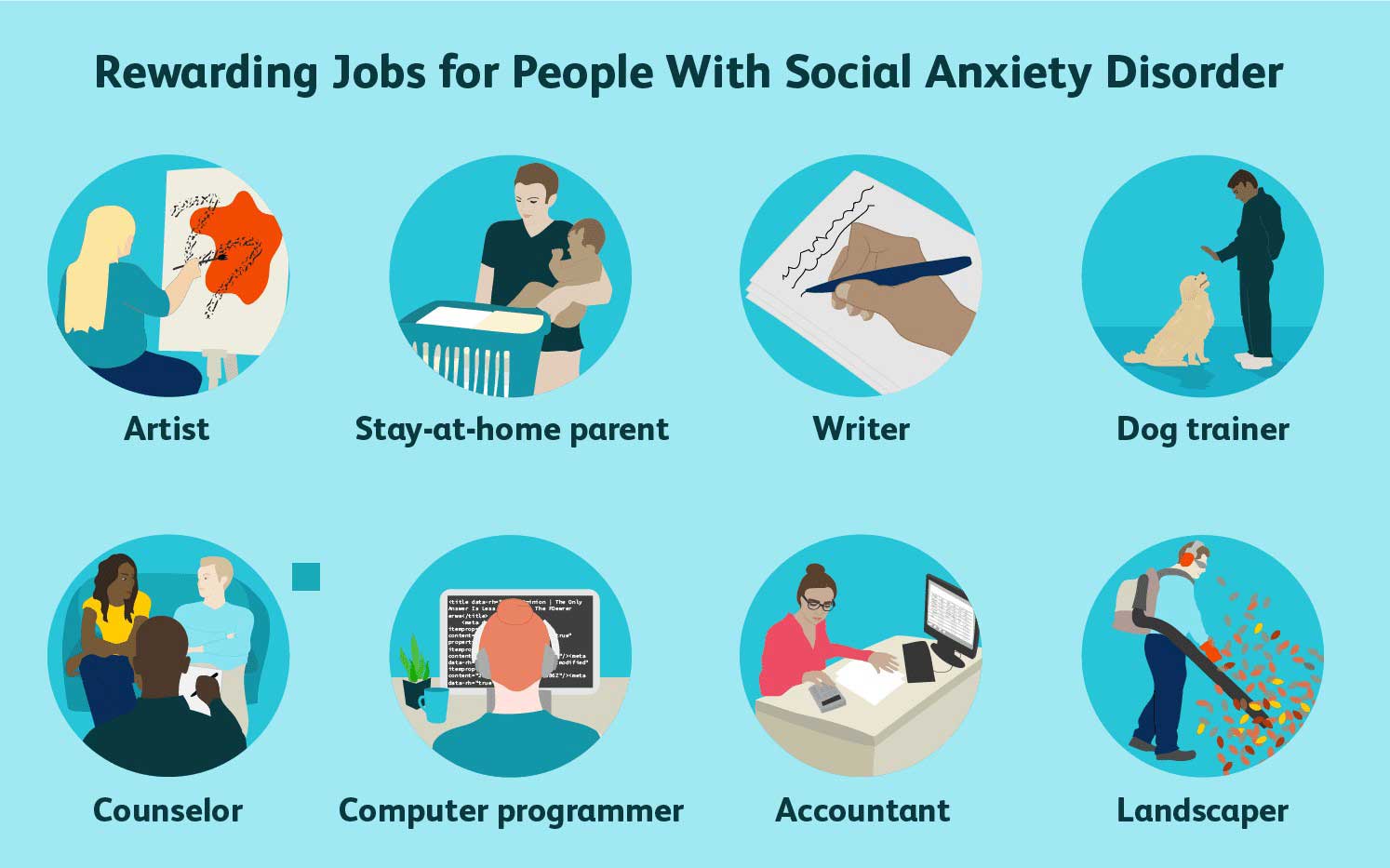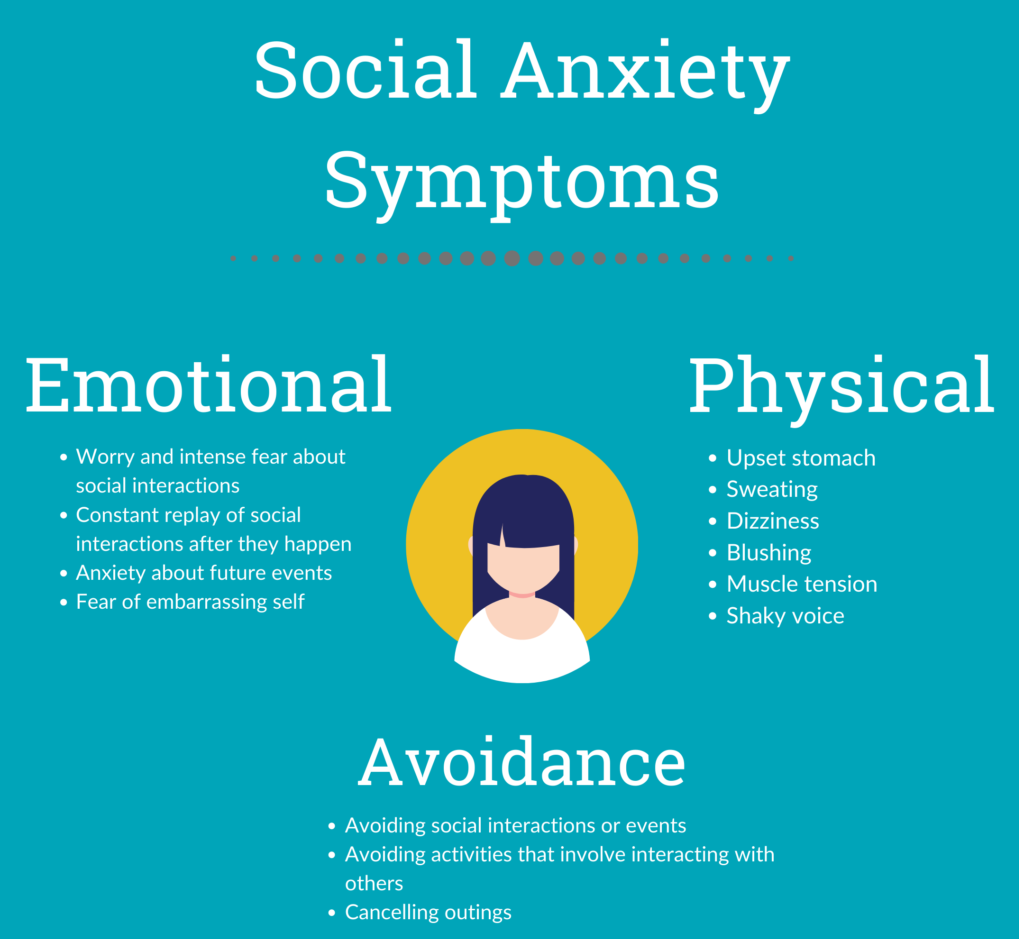Social anxiety disorder (SAD) or social phobia is an anxiety disorder characterized by extreme fear of getting involved in social situations. People with this disorder have trouble talking to people, meeting new people, and attending social gatherings. They fear being judged or scrutinized by others.
The exact cause of the social phobia is unknown. However, current research supports the idea that it is caused by a combination of environmental factors and genetics. Cognitive-behavioral therapy (CBT) has been shown to work best for treating social anxiety disorder.
Physical abnormalities such as a serotonin imbalance may contribute to this condition. Serotonin is a chemical in the brain that helps regulate mood. An overactive amygdala (a structure in the brain that controls fear response and feelings or thoughts of anxiety) may also cause these disorders.
Social Anxiety is the third largest mental health care problem in the world today. Social anxiety disorder, also called social phobia, is an anxiety disorder in which a person has an excessive and unreasonable fear of social situations. Anxiety (intense nervousness) and self-consciousness arise from a fear of being closely watched, judged, and criticized by others.

Many people get nervous or self-conscious on occasion, like when giving a speech or in a job Interview. But social anxiety disorder, or social phobia, is more than just shyness or occasional nerves. Social anxiety disorder involves intense fear of certain social situations, especially situations that are unfamiliar or in which you feel you’ll be watched or evaluated by others.
These situations may be so frightening that you get anxious just thinking about them or go to great lengths to avoid them, disrupting your life in the process. Underlying social anxiety disorder is the fear of being scrutinized, judged, or embarrassed in public.
You may be afraid that people will think badly of you or that you won’t measure up in comparison to others. And even though you probably realize that your fears of being judged are at least somewhat irrational and overblown, you still can’t help feeling anxious.

CAUSES OF SOCIAL ANXIETY DISORDER
People with social anxiety disorder are fearful of or anxious about certain social situations due to a fear of negative judgment, embarrassment, or rejection.
Some people experience anxiety in most social situations. For others, anxiety is connected to specific social situations, such as speaking to strangers, mingling at parties, or performing in front of an audience. Common social anxiety triggers include:
- Meeting new people
- Making small talk
- Public speaking
- Performing on stage
- Being the center of attention
- Being watched while doing something
- Being teased or criticized
- Talking with “important” people or authority figures
- Being called on in class
- Going on a date
- Speaking up in a meeting
- Using public restrooms
- Taking exams
- Eating or drinking in public
- Making phone calls
- Attending parties or other social gatherings
SYMPTOMS OF SOCIAL ANXIETY DISORDER
The symptoms tend to occur in certain social situations and may include:
- Physical symptoms – such as blushing, sweating, trembling, nausea, and increased heart rate, and the mind “going blank”
- feelings of panic or panic attacks
- fear of experiencing anxiety or of seeming anxious in front of others
- intense fear of judgment from others
- feelings of fear or dread in situations with other people, especially strangers
- feeling very self-conscious, embarrassed, or awkward in front of others
- having difficulty speaking
- avoiding situations that might trigger anxiety
- a rigid body posture and a soft voice during social interactions
- difficulty making or maintaining eye contact
- sensitivity to criticism, low self-esteem, and negative self-talk
- These symptoms can greatly disrupt daily life, such as school, work, and relationships.
Without treatment, the person may not achieve their potential at school or work, as they may avoid participating in group tasks, speaking in front of groups, or receiving a promotion.
When severe or chronic, social anxiety can lead to the development of other conditions, such as depression or substance use disorders.
In children, the symptoms appear in interactions with both adults and peers. Their feelings of anxiety might appear as:
- crying
- throwing tantrums
- freezing
- clinging to a parent or caregiver
- shrinking
- not speaking in social situations
TREATMENTS FOR SOCIAL ANXIETY DISORDER
Various treatment options can help people manage their symptoms, gain confidence, and overcome their anxiety. Treatment results differ from person to person.
Of all the professional treatments available, cognitive-behavioral therapy (CBT) has been shown to work best for treating social anxiety disorder. CBT is based on the premise that what you think affects how you feel, and your feelings affect your behavior. So if you change the way you think about social situations that give you anxiety, you’ll feel and function better.
CBT for social phobia may involve:
- Learning how to control the physical symptoms of anxiety through relaxation techniques and breathing exercises.
Challenging negative, unhelpful thoughts trigger and fuel social anxiety, help to replace them with more balanced views. - Facing the social situations you fear in a gradual, systematic way, rather than avoiding them.
While you can learn and practice these exercises on your own, if you’ve had trouble with self-help, you may benefit from the extra support and guidance a therapist brings. - Role-playing, social skills training, and other CBT techniques are the parts of group therapy. Group therapy uses acting, videotaping and observing mock interviews, and other exercises to work on situations that make you anxious in the real world. As you practice and prepare for situations you’re afraid of, you will become more and more comfortable, and your anxiety will lessen.
- Medication – Medication is sometimes used to relieve the symptoms of social anxiety, but it’s not a cure. Medication is considered most helpful when used in addition to therapy and self-help techniques that address the root cause of your social anxiety disorder.
Three types of medication are used in the treatment of social anxiety:
-
- Beta-blockers are used for relieving performance anxiety. While they don’t affect the emotional symptoms of anxiety, they can control physical symptoms such as shaking hands or voice, sweating, and rapid heartbeat.
- Antidepressants may be helpful when a social anxiety disorder is severe and debilitating.
- Selective serotonin reuptake inhibitors (SSRIs), which people mainly use as antidepressants, can also help with the symptoms of social anxiety disorder. Serotonin is a chemical in the brain that helps regulate mood. An overactive amygdala (a structure in the brain that controls fear response and feelings or thoughts of anxiety) may also cause these disorders.
- Benzodiazepines are fast-acting anti-anxiety medications. However, they are sedating and addictive, so are typically prescribed only when other medications have not worked.
If you notice symptoms of social phobia in your loved ones, call us on 469-545-9983 to book an appointment with Dr, Seema Kazi, our expert psychologist.
